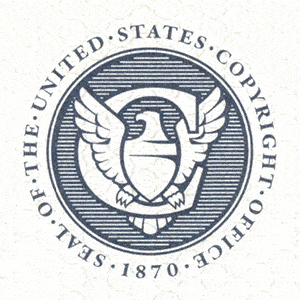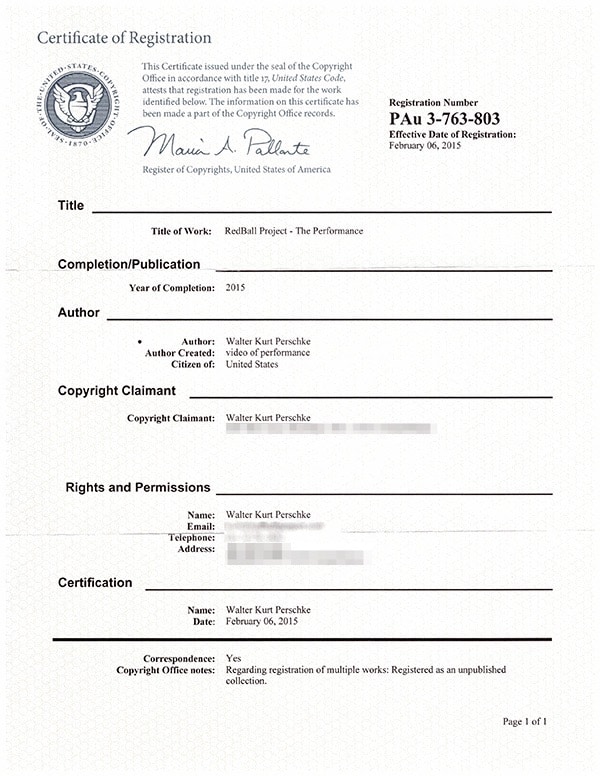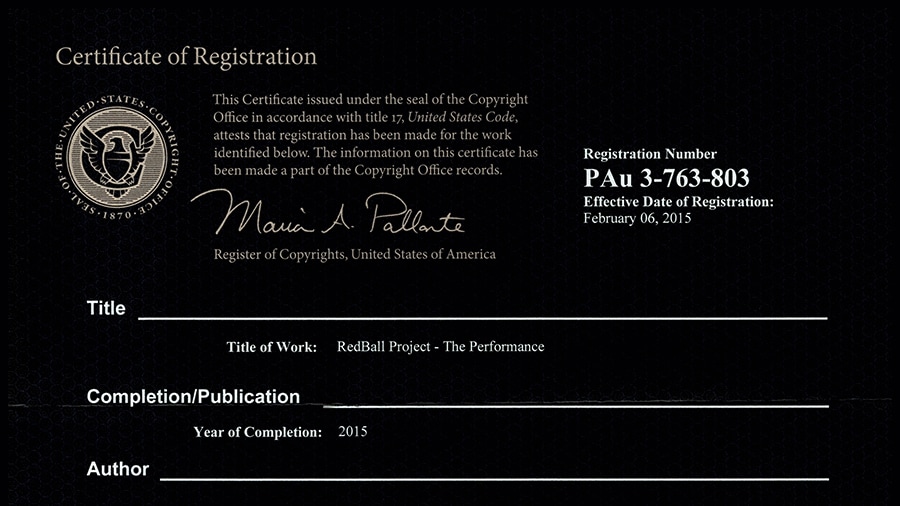The sad truth is that what your art professor, your artist friend, or some respectable art blog, has told you about visual artist copyright is probably extremely misleading.
I’ve initiated two international copyright lawsuits against global conglomerates, and a key misunderstanding that most artists believe about copyright cost me over $100,000, probably more.
If you’re like most artists, you believe that merely by virtue of making an artwork, you have copyright over it. You’re right, in all the most useless ways, but none of the real ones that matter.
This is not a legal guide, it’s a practical view of copyright laws for visual artists based on experience.
What is the purpose of copyright protection for visual artists? Why have your works under copyright at all? It’s an essential question to clarify why you need a Registered Copyright versus what you have now. The difference is immense, and I’ll explain what registered copyright is and how to get it. But let’s face it; you’re not going to bother with the work if you don’t know why it matters.
So first, let me walk you through this and you’ll see where common knowledge and reality diverge.
Do you have a certificate of registration for your copyright?

Copyright for Artists in the Real World
Typically you think of copyright as protection, right? It will PROTECT you from someone coming along, ripping off your work and making a greeting card, a TV commercial, or any commercial exploitation that they did not get permission for, or pay you for usage.
Here’s the kicker that I didn’t know until I learned it the expensive way.
How do you actually USE that protection when you need it? Let’s say it happened to you, now what?
The first thing you need is a way to enforce your copyright in the legal system. No one automatically does this for you. If you don’t catch it and enforce your copyright, no one else will (hint: the government is not doing it for you!)
What the art lawyer’s first question is to you
So you’ll need a lawyer. The lawyer costs money, usually a retainer upfront to get started. Are you going to spend that money? Now you’re calculating how much it might be worth versus how much it could cost, and often for visual artists, the upfront retainer means you’re not going to defend your copyright. I mean how can you know what you might receive if you were to win a settlement? You ask a lawyer.
One of the first things the lawyer will ask you is if you have registered the copyright of your works. When I worked with Amer Ahmed at Gibson, Dunn & Crutcher on my first lawsuit (pro bono via the VLA), he asked me this exact question.
I gave him the answer most artists would, ‘I have an artist copyright, don’t I ?’ He said yes, your work as an artist is under copyright protection from the moment of creation. Great!
Why they ask for your copyright registration $$$
What Amer was too kind to tell me then, but gently explained after our suit was successfully completed, was the settlement check could have been 3 times as big if I had this Certificate of Registration before the infringement.

Money & Artist Copyright
This factor matters more than money because it goes back to the essential question: if your art copyright is violated, how do you defend it? Or put another way, if you’re not prepared to protect your copyright, then practically speaking, you might as well not have it.
If the idea that your works are automatically under copyright protection gives you warm fuzzies about your rights, and you think that matters, well, that’s nice 🙂 but your own comforting thoughts are about all you have. If you’re a professional visual artist with your work out in the world, you need the real thing.
How to be eligible for statutory damages and why it matters
The magical difference that registered copyright offers is called statutory damages.
Statutory damages, called this because they’re listed in the Copyright statute section 504, are simply damages – money! – assessments in a settlement. They operate like set fines. Statutory damages are critical because these damages have a set dollar value range in the law.
Let’s compare this to the type of damages you’re eligible for if you have not registered your copyright, which are limited to actual damages.
Want a million-dollar settlement because a company used your art in a national commercial?
Great, so you’ll have to prove to the court that you lost the actual profit you otherwise would’ve had earned, because your license fee is $1,000,000 and they didn’t pay it. And, of course, you’ll prove that’s your fee because someone has paid it to you before. Begin to see the issue? This is really difficult to prove in court, and you’ll have to be an artist already charging six-figure fees for license rights to copyrighted work. ( And if you are, you’ll likely have registered copyrights and be eligible for statutory damages).
So when the rubber meets the road, actual damages are a tough way to go, and it’s likely not going to be worth it.
Why Visual Artists Need to Register Copyright
If you have a Registered Copyright, your chances of being able to successfully defend your copyright go up immensely.
This is for three reasons.
- The potential settlement money for artists is both more significant and more certain. Now your lawyer can consider taking your case on contingency, which means they get a percentage of your settlement. In my second case, the contingency fee was 30%. To make this work for a lawyer, the total possible number has to be big enough that 30% will matter to them. It will probably need to be tens of thousands of dollars potentially, not a few thousand, to get things moving.
- Since contingency becomes possible, your chances of taking action also go up. Without having to spend money upfront, you’re in a stronger position to defend your copyright, which is actually the real reason to have it, right?
- Having a Registered Copyright will give the lawyer a powerful tool when they contact the other lawyers (yes, it’s lawyers all the way through). So not only is there more money on the table now, there’s also a powerful tool to wield and make your case towards a successful outcome.

Let us consult the FAQ oracle of the U.S. Copyright Office to clarify the fine print and the difference of what’s true versus what matters. The emphasis in the quotes is mine.
“When is my work protected?
Your work is under copyright protection the moment it is created and fixed in a tangible form that it is perceptible either directly or with the aid of a machine or device.” – U.S. Copyright Office
Yea! This is the misleading truth almost all artists hinge their career’s work on, and the next bit gets to what matters.
“Do I have to register with your office to be protected?
No. In general, registration is voluntary. Copyright exists from the moment the work is created. You will have to register, however, if you wish to bring a lawsuit for infringement of a U.S. work. See Circular 1, Copyright Basics, section “Copyright Registration.”” – U.S. Copyright Office
Opps! If you want to protect and defend your copyright, yea, you’ll wish you had a registered copyright, or you might be out of luck. And the next logical question gets to it – money.
“Why should I register my work if copyright protection is automatic?
Registration is recommended for a number of reasons. Many choose to register their works because they wish to have the facts of their copyright on the public record and have a certificate of registration. Registered works may be eligible for statutory damages and attorney’s fees in successful litigation. ” – U.S. Copyright Office
“Can’t I just register copyright if I see my work being abused? I’ll do it then and be protected!”
No. To be eligible for statutory damages, you need one of two things.
- have registered the copyright before the infringement begins
- have registered the copyright within the first 3 months of ‘publication’ of the work.
So unless you’ve had your work ripped off almost immediately and can catch that rights infringement and pursue it (an improbable scenario), you’ll need registration in place.
Deciding to take action, do you really need registered copyright?
Can your artwork work be found on Google?
So the reality is this: professional artists need a registered copyright for their work if they think there is any chance at all of those works being ripped off. If your artwork turns up in search engines, then the answer is yes.
Probably my #1 source of commission referrals for RedBall, if someone doesn’t already know about the work, is Google Search (and not for my name). That’s right, people really find art that way.
Increasingly brands, fashion, and ad agencies are looking to the arts for ideas, and well-meaning or not, the risks of your work being ripped off are real. They will do massive google image searches looking for ideas around a concept, then create mood boards of research to review. Often the concepts they come up with are informed by this visual research, and sometimes knowingly or not your work can get folded into a campaign. This is, in my opinion, the #1 copyright risk for artists today.
The ad agency is not the enemy, well…unless they really messed up.
I want to be clear on this, I have worked with major brands around the world. I’ve partnered with and developed concepts for some of the top international ad agencies like Ogilvy, DDB, Wieden and Kennedy & Havas, among others. I’ve had great experiences with agencies, they are not the enemy. The number of creative ideas and sharp right turns that move through a single campaign is immense, it’s a big net with a lot of people involved, and things can fall through the cracks. The onus is on you as an artist to speak up for yourself.
“But wait, OMG, I can’t possibly register a copyright for each piece I make! That is insane.”
Yes, doing it one at a time would be crazy, but you don’t have to. You can get years of your work protected with registered copyright for $55. Yup, $55 bucks to get the real thing. That’s what the U.S. Copyright Office charges as of this writing.
How you get it, how to apply and have it registered, and importantly, how to cover potentially years of work if you need to, is the next post. It’s based on a system the intellectual property lawyers I’ve worked with showed me, and now I’ll show you.
I’m going to register a copyright for myself covering a few years of recent work. I will make a video of my doing it, with a step by step guide for you to follow through the copyright forms.
Make sure you are on the mailing list, and I’ll let you know as soon as it is posted.
A few side notes on this post:
Pro-Bono Lawyers
Some states have a non-profit called the Volunteer Lawyers for the Arts. When I lived in NYC, I worked with them on my first lawsuit. The VLA in NY is actually the oldest of these organizations. This is a fantastic legal pro-bono organization, and you should absolutely see if you have one in your state! However, even if you do, you will still want to register your work. Yes, the pro-bono lawyer might be free, but they also might not be available when you need them, or be able to defend you as well without registered copyright.
How to find pro-bono legal help for artists in your state
Here are two great lists to search in. I would certainly look at both as these types of lists are not updated super often, and if you don’t find one near you for sure search google for a VLA in your area
- Copyright Alliance: Creator Assistance Directory
- Volunteer Lawyers for the Arts in New York: VLA State Directory
Copyright Alliance
The Copyright Alliance is a DC-based non-profit that has a lot of info for artists and creators on copyright, membership for artists is free and includes webinars and other member-only info. They also have cool info like ongoing cases, like a Dr. Seuss copyright case! This is also a group working for your rights in DC.
Photographers Copyright Protection Services
So photographers have big copyright issues and there are paid monitoring services that can assist with this. They cost money and take a cut, but for some photographers with commercially applicable work it’s something to look into. If you already repped by an agency like Getty, like my photographer Brit Worgan, this is probably being done for you.

